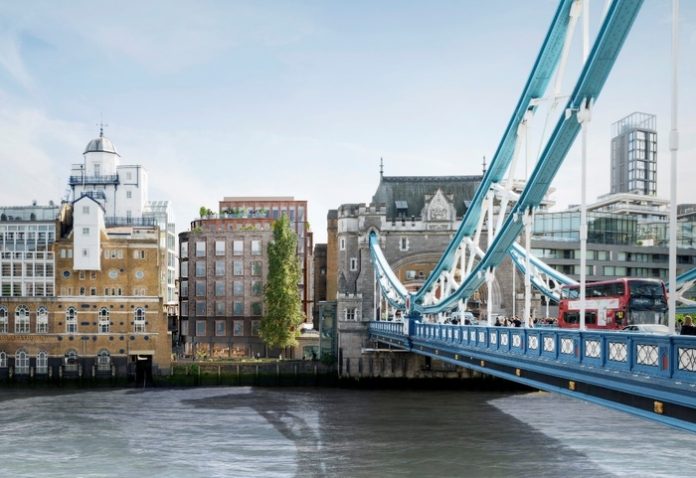Ethical investor & developer commits to retrofit first strategy and advocacy role to ensure transition to net zero carbon economy also drives positive social outcomes
FORE Partnership, the purpose-driven, transformational real estate investment firm, has committed to a wide-ranging and ambitious target to ensure its business and buildings are net zero carbon by 2025.
The ethical investor’s commitment, announced on World Environment Day and endorsed by the World Green Building Council, will see all its owned assets and new developments achieve zero carbon in operation by 2025.
FORE’s 2025 commitment puts it among a select few property businesses to have announced such an early target, and forms part of the firm’s strategy to drive wider positive social and environmental outcomes through a systemic approach to the built environment and its investments.
FORE’s approach includes a retrofit first strategy, focusing on reusing and repurposing buildings to extend their life spans, while retaining the embodied carbon in their structures. This is demonstrated by TBC London, a 110,000 sq ft forward-thinking workspace next to Tower Bridge, which recently achieved planning permission. The building will be 100% electric and zero carbon in operation, making it one of the UK’s most sustainable offices.
Central to FORE’s strategy is a commitment to championing a smart and just transition to a low carbon economy. It will seek to ensure disadvantaged groups are not left behind, driving community resilience, skills training and clean growth, while supporting smart solutions around biodiversity and rewilding, offsetting, and smart finance.
These initiatives include:
Employing, training and upskilling the local workforce in low carbon building design, construction and technology
Only working with suppliers who sign up to its living wage commitment and procurement policies that include detailed obligations around training, apprenticeships, and other programs specifically targeted at skills people need to thrive in a low carbon economy
Providing ‘urban village halls’ in FORE’s buildings as free space for local social enterprises and community groups
Supporting ‘clean proptech’ start-ups where appropriate and seeking to transform outmoded supply chains
Working on digital inclusion in communities and deliveringprograms around entrepreneurship and innovation
Implementing a smart approach to offsetting that includes solutions that improve community cohesion, enhance wellbeing, and deliver education opportunities.
Only working with banks and financial institutions that have a clear, demonstrable, measurable commitment to a low carbon future with a defined pathway that aligns with FORE’s own net zero pledge.
The World Green Building Council today announced that over 95 signatories are now part of the Net Zero Carbon Buildings Commitment, nearly doubling participation in this collective statement of climate action since last year.
The WorldGBC’s Net Zero Carbon Buildings Commitment calls on businesses, organisations, cities, states and regions to reach net zero carbon operating emissions within their portfolios by 2030, and to advocate for all buildings to be net zero carbon in operation by 2050.
The UK government has set its own target for the nation as a whole that will require the UK to bring all greenhouse gas emissions to net zero by 2050.
Basil Demeroutis, Managing Partner, FORE Partnership, said:
“We firmly believe that recovery from the COVID-19 crisis must be driven by a climate-led economic plan that accelerates the transition to net-zero. Low carbon, socially responsible design forms part of an important narrative that brings people to our cities, our communities, and our buildings. We must give our tenants and their stakeholders positive reasons why they should come work and play in our buildings, and transition away from being preoccupied with offices simply as places where work gets done.
“On World Environment Day, we are therefore proud to commit to achieving net zero in the next five years. As an ethical real estate investor and developer that means we will ensure that all our owned assets and new developments will be net zero carbon in operation by 2025. This is a bold commitment that we’re determined to achieve through a series of industry-leading measures, including a retrofit first strategy that takes into consideration embodied carbon, while seeking to drive positive social outcomes through all our projects.
“We believe the industry needs to consider its work in the context of urban systems, and thus our strategy focuses on taking a more systemic approach to driving environmental and social outcomes. This is essential if we are to ensure the transition to a low carbon economy is just and smart.”
FORE was originally set up by a team out of Capricorn Investment Group, the family office of eBay’s first president and billionaire philanthropist Jeff Skoll, in 2012, with a vision to drive financial returns by deeply embedding environmental and social impact in its real estate strategy.
Since inception, FORE has acquired more than 1 million square feet of commercial and residential property with a with a forecast exit value of more than £650m on behalf of private and institutional investors from Europe, North America, Asia, and the Middle East.
Recently completed projects include Windmill Green, an 82,000 sq ft ultra-sustainable workspace in Manchester, which is the first multi-let office in Manchester to be rated BREEAM ‘Outstanding’. The speculative office building has attracted a number of tenants including CBRE’s flexible workspace operator Hana, which is opening its first offering outside London at Windmill Green, and tech firm Interact. The building has been nominated for awards by the RICS, RIBA, BCO, the Manchester Chamber of Commerce, and Property Week.
FORE also recently opened its first co-living project, The Italian Building in London, in partnership with Mason + Fifth, which is designed to achieve WELL V2 certification, and is exploring further opportunities in the co-living sector.
Other notable projects include, Geisberg Berlin, a stunning restoration of a listed building in Berlin into a residential block which was the first historic landmark residential building to receive DGNB ‘Gold’ certification anywhere in Germany.






















